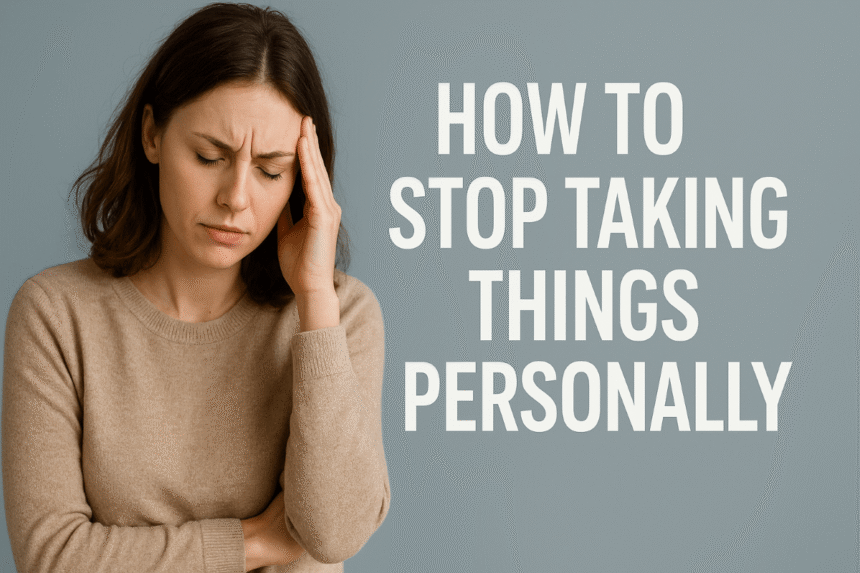How to Stop Taking Things Personally is a powerful skill that can transform your relationships, boost your confidence, and bring peace to your everyday life. Many of us tend to absorb other people’s words or actions as if they are direct attacks, even when they are not intended that way. This habit often leads to stress, misunderstandings, and unnecessary emotional pain. The truth is, what others say or do usually reflects their own mindset, mood, and perspective—not our worth or identity. By learning to let go of personal interpretations and focusing on self-awareness, you can respond with clarity instead of reacting with hurt. Developing this mindset allows you to live with greater freedom, stronger resilience, and healthier connections.
Ways to Stop Taking Things Personally
Taking Things Personally is one of the biggest obstacles to peace of mind and healthy relationships. When someone criticises, disagrees, or even makes a careless remark, many people immediately attach it to their self-worth and feel hurt or offended. The truth is, most of the time, what others say or do is more about them—their mood, experiences, and perspectives—than about us. By learning not to take things personally, you free yourself from unnecessary emotional pain and gain the power to respond calmly instead of reacting impulsively. This shift in mindset helps build confidence, improve communication, and maintain inner balance even in challenging situations.
Taking things personally can sneak into our daily interactions like an invisible trap, making us feel attacked when no attack was intended. Taking things personally often feels vindicating—it’s a short-term boost to our ego—but over time, it leads to unnecessary stress, drama, and damaged relationships. The reason this happens is deeply rooted in the brain’s fight/flight response. Taking offence is a sophisticated defence mechanism our minds use to protect a fragile sense of self-worth.
Step 1: Clarity—Check the Facts vs. the Story
The first step to stop taking things personally is clarity. Whenever someone says something that triggers you, pause and distinguish the fact from the story you’re telling yourself. Our emotions are driven 90% by our story, not the actual event.
Example: When a lady moved to another place, she assumed comments on her weight were insults, shaped by her experiences in that culture. Over time, she discovered that they are casual remarks about appearance are often a way of showing warmth or familiarity, and not criticism. When she reframed the story from “They are insulting me” to “They are being friendly,” her emotional response shifted completely.
Tips: Slow down before reacting, breathe, and get curious about the other person’s perspective. Ask yourself: What evidence do I have that this is really about me? Could there be another explanation?
Step 2: Boundaries—Know What You Can Control
Step two is setting boundaries. Recognise where you end and the other person begins. Often, we take offence because we try to control others’ behaviour to protect ourselves. Instead, focus on your response and the values you want to uphold.
Example: If someone criticises your work, rather than labelling them as a jerk, determine whether the feedback is valid. Can you improve? Is this a personal attack or simply their perspective? Focus on your part—you can control your growth, not their words or intentions.
Tips: Use a simple exercise: divide a paper into what I can control and what I can’t control. Toss the list of uncontrollable items and focus your energy on your actions, responses, and values. This strengthens your emotional security.
Step 3: Build Self-Worth—Anchor Yourself Internally
The final step—and often the most powerful—is developing an internal sense of self-worth. People take things personally because they feel insecure or need validation. True security comes from cultivating your character and living according to your values.
Example: If you’re sensitive about your role as a partner, focus on the kind of partner you want to be—supportive, patient, and loving—rather than controlling how others treat you. As you live these values consistently, external opinions matter less.
Tips: Seek feedback only with the intention to grow. Let go of perfectionism, focus on the journey toward your values, and practice vulnerability. The stronger your internal foundation, the less likely you’ll take things personally.
How to Stop Taking Things Personally? Emma McAdam
Do you often find yourself taking things personally or getting offended too easily? Do you waste time labelling others as the “jerk” in the situation? Taking things personally is actually a complex defence mechanism we use to protect ourselves when we feel threatened—but it usually leaves us feeling insecure, isolated, and drained. In this video, explore three powerful steps to break this habit and learn how to stop taking offence with confidence.
Time Stamps:
- 00:00 Intro
- 00:44 Why You Should Know How To Stop Taking Things Personally
- 03:01 Step One: You Assume Someone Is Out To Get You
- 03:41 Step 2: You Label The Other Person
- 04:49 Step 3: Quietly Continue Your Sense Of Insecurity And Isolation
- 06:08 Three Steps To Stop Taking Things Personally
- 13:31 Exercise: What You Can And Can’t Control
Practical Application: Quick Response Strategies
- Pause: Don’t react immediately. Close your mouth, take a breath, and create mental space.
- Clarify: Use assertive communication. Ask, “Can you explain what you mean?” or “That’s interesting—can you clarify?”
- Reflect: Decide whether it’s worth acting on. Use journaling to separate what you can change from what you cannot.
- Act: Focus on improving yourself and living your values, instead of trying to manipulate others’ behaviour.
Conclusion
Taking things personally is a mental habit rooted in defence and insecurity, but it’s replaceable. By practising clarity, establishing boundaries, and strengthening self-worth, you can respond with calm confidence instead of reactive offence. Remember, the goal is not to avoid all criticism, but to anchor yourself internally so that external words and actions do not shake your sense of self. Through these three steps, you cultivate emotional resilience, reduce drama, and build stronger, more secure relationships.
Have you ever caught yourself taking things too personally?
What strategies have helped you respond with clarity and confidence instead of offence?
5 FAQs on Stop Taking Things Personally
1. Why do I take things personally so often?
You take things personally because your brain interprets certain comments or actions as threats to your self-worth. This defence mechanism is rooted in past experiences, insecurities, or cultural conditioning.
2. Is it wrong to feel offended sometimes?
Not at all. Feeling offended can be natural, especially if your boundaries are genuinely crossed. The problem arises when you take offence habitually, even in harmless or neutral situations.
3. How can I tell if someone’s comment is really about me or not?
Pause and separate facts from assumptions. Ask for clarification if needed, and remember—often people’s reactions say more about them than about you.
4. What’s the first thing I should do when I feel offended?
Take a breath and avoid reacting immediately. This pause gives you time to check your story, gain clarity, and choose a healthier response.
5. How do I build the confidence to stop taking things personally?
Focus on strengthening your self-worth through your values, boundaries, and growth mindset. When you are secure in who you are, others’ words or opinions have less power over you.
Thank you for taking the time to explore this post. I hope you found it both insightful and enjoyable.
Remember, your sharing can make a positive impact! Please share this post across your social media and other networks, allowing others to benefit from its content.
PVM

Mathukutty P. V. is the founder of Simply Life Tips, a blogger, content writer, influencer, and YouTuber passionate about learning and sharing. Guided by “Simple Living, Creative Thinking,” he believes in the power of knowledge sharing and lifelong learning.
Related
Discover more from Simply Life Tips
Subscribe to get the latest posts sent to your email.







